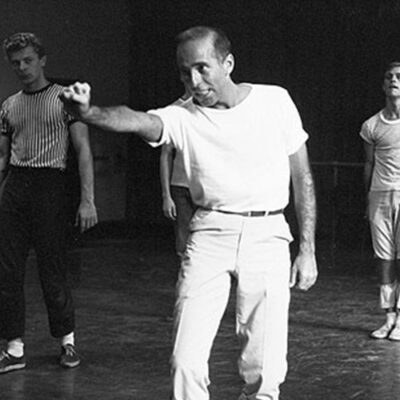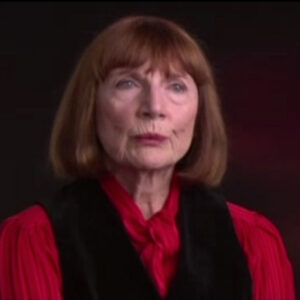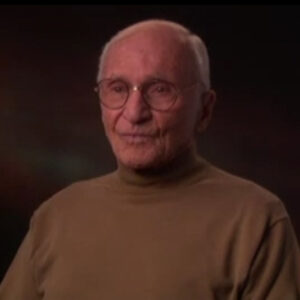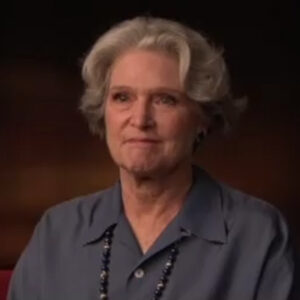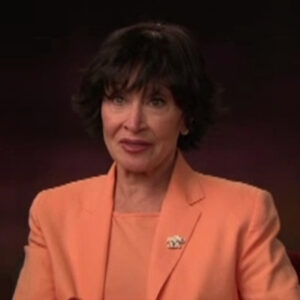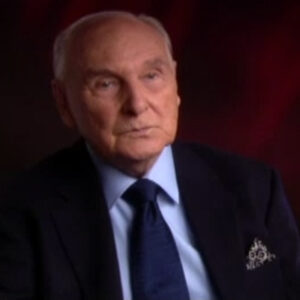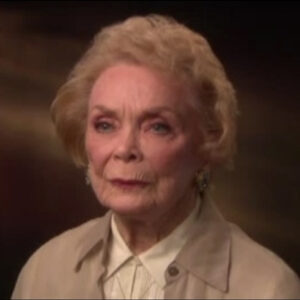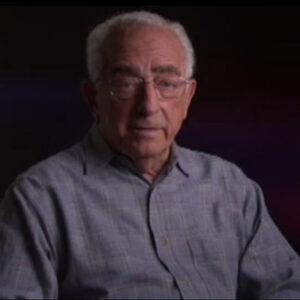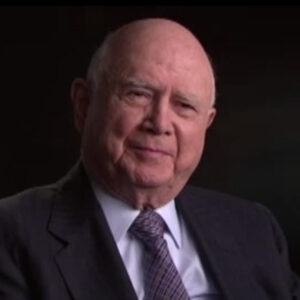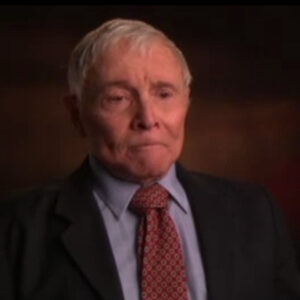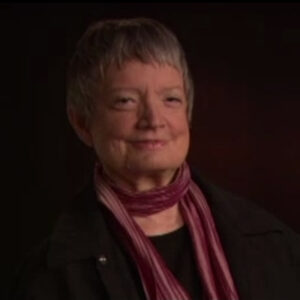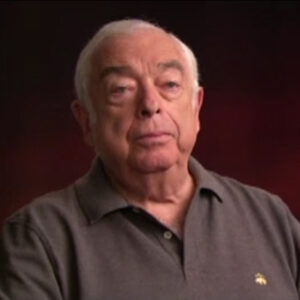Speaker Tell me about when you met Jerry. Could you sort of paint a picture for me of what it was like at that time?
Speaker I was looking for Gerry for a couple of years because we need a vote in equity. And he was a ballet dancer. That was just a way all the time. And Lois Wheeler and I were gathering votes for the equity vote against Frank Fay, who had made a terrible speech and resolution on the floor of equity equity. Never participated in blacklisting, by the way. They were very good, but we were looking for votes in these early days. I’m not good at dates.
Speaker I don’t remember the date. But one of the other things we were doing was supporting local eleven ninety nine, which started out by being pharmacists union and ended up being nursing homes and hospital workers, became one of the most powerful unions and still is one of the most powerful unions in the country. And equity is part of the AFL-CIO organizing effort was helping them at a dance down and asked the place where the 99 has big headquarters. And I love to Lindy Hop. And I was doing a Lindy hop and a darling young man came over and tapped me after it and said, My name is Jerome Robbins. And I said, Oh yes, she was up on the sidelines. I said, Lois, here he is. Here’s our vote. You know what I was screaming about? And I said, we’ve been looking for you. We need your vote in inequity. He said, Well, I’ve been with the ballet since I was about 13. And he said, that’s what I want to talk to you about. I’m preparing a ballet for three sailors. I think it was for the American Ballet Theatre, he said. And I don’t I’ve been on the road and I don’t know any street dances. Will you teach me to Lendee? Which I did, but I imagine I’ll talk to you later about how he named me. And I introduced him to Lois Wheeler then. But then later I took him and Arthur Laurents to Lois Wheeler’s first big hit on Broadway trio, which was about her and the French actress.
Speaker Oh.
Speaker Like Maria.
Speaker Sanctuary, so I’m going to stop you for a second, let’s just go back and don’t worry, I’m going to ask you about everything through it.
Speaker Yes, try to sort of. Yes. And the question, OK, try to sort of stick to the question, which is in the beginning when you met Jerry, I’m just curious about what he was like, if you could focus on you.
Speaker OK, so this young man interrupted the dance and said, I’m Jerry Robbins. And I called Lowis over and said I had found Jerome Robbins. And he said, well, we said we’ve been looking for your equity vote. And he said, well, I’ve been on the road since I’m about 13, so that’s why you haven’t found me. But that’s what I want to talk to you about, because I’ve been on the road. I don’t know any street dances. Would you teach me Lendee? He was charming. He had a delightful smile. And he was darling, charming and funny and witty. And we we had a minor flirtation for a while there.
Speaker And he was just adorable.
Speaker Now, you introduced him to you mentioned Lois. Tell me about how you use your whole name. You introduced him to her, I think, and told me what happened between the two of them, OK?
Speaker After I got to know Jerry, he introduced me, I think, to Arthur Laurents and who was a beginning playwright at that time and also a darling man, and I had, I think, at least three tickets to a show that Lois Wheeler was in on Broadway with, I think Biff Maguire and the famous French actress whose name I can’t remember at the moment. But it was Trio, it was on Broadway. And my then husband, I was married and I think I had a year old baby.
Speaker So that was.
Speaker 59 years ago, and we went down the alley at the end of the show and both Arthur Laurents and Jerome Robbins had fallen in love with Lois from the stage, and Jerry began a romance with her. And I think they ended up living above the Cherry Lane Theater for a year or two. She later married a famous writer and she lives in Switzerland. He wrote a famous book like Red Star over China or famous political book. I’ve forgotten his name also. But Lois was a beautiful and brilliant actress and. Even though I’d had a flirtation with Jerry, I introduced him to. Lois, we didn’t know much about homosexuality in those days and then once the. Somebody like Cindy Adams or some gossip columnist called me and said, are you going with that fag Jerry Robbins? And I said, Fag, how dare you? You know, and. I told him I didn’t think so of this and that, so I introduced Jerry to Lois Wheeler and later I either introduced him to Rose Tobias or.
Speaker I knew Rose to since I was 15 or 16, and she was a gorgeous blonde who lived with him for a year or two.
Speaker She lives in London now and she I run into when I go to London, she’s still gorgeous. And she says she was married to Gerry at one point. Some time says that. But I don’t know if that was true, but it was a long relationship. Both were long relationships.
Speaker And I when I later when I found out that Gerry was gay, I asked Lois how she felt. This was after she’d lived with him for about a year. And she said, I’m fine till the American Ballet Theatre comes to town and then I’m a third person. So that’s my little side story about that.
Speaker I think it’s it’s hard for people today to understand what your motivation was and other people such as yourself, lots of artists and intellectuals who championed the Communist Party in the 30s and 40s. So I wonder if you could sort of set the scene for us and tell us what was it about the Communist Party that appealed to you so much those days?
Speaker The Communist Party in those days was a legal party that was promoting socialism and things I had been raised in a Jewish home.
Speaker We were Jewish and we celebrated the holidays, but we were atheists and my parents were socialists who had fled the Cossacks in Warsaw. And it’s a matter of fact, my mother fled in a hay wagon with a 10 year old brother because her father had preceded her to America. And like a lot of men. Committed bigamy, married somebody in America and hadn’t sent for her for years, and then her mother died of the flu epidemic in Warsaw.
Speaker So my mother was about 12 or 13 with a 10 year old brother in a hay wagon that they hid in when they went to Bremen to catch a boat to come to America. And as she used to tell me the story, the Cossacks swords that went into the haystacks, it used to get closer and closer to her nose. I wondered how her nose was not cut off by the time she told us the story and she had terrible crossing and. Her father did not meet her at the boat. She followed the crowd, some other people took her wolf Ellis Island with her little brother, and she followed the crowd which dispersed. And she just sat down on a curb on Spring Street and began to cry. And someone came along who spoke Yiddish, which she mainly spoke, and they took her to her father on one of the Lower East Side Streets. And she had a terrible stepmother and a lot of problems like that. But having been raised in a socialist house, my principles were very pro socialist.
Speaker My mother was an avid leftist and my father was one of the organizers of the aisle, GW, because they both became Needell workers. My father was a cloak and suit designer and my mother was a milliner. So they were part of the early union movement in which the Communist Party was very active.
Speaker Everything I’d ever heard about it, including from my parents, was of good things. And I never did anything that I was ashamed of. It was always and most of my blacklisting came about because we were very pro union and very active. And after Screen Actors Guild and Actors Equity and most of all, blacklisting came from people who were trying to break the unions. So everything that the Communist Party and the Communist Political Association did was. OK, with me, I wasn’t interested in Starlin, I was interested in the union and for working people to have Social Security, medical care, all the things that are disappearing at the moment were. Initiated and stimulated and supported by the Communist Party through the.
Speaker The union movement and interracial employment, I had many black friends, Ossie Davis and Ruby Dee were close friends of mine and my late husband, Jack Gilford, they were in the world of Shlemiel at home together, and they became close friends.
Speaker And we most of my listing in red channels and Jack’s listing is because our interracial employment. Organizations, so and the Communist Party did everything about that, they really did. They bonded with the church movements and with all the movements that were doing interracial employment. Sidney Poitier and I sponsored a resolution in after American Federation of Television and Radio Performers. And it was a simple resolution that said. Let the casting directors of TV shows meet with the committee in after that has pictures in resumes of black and minority actors so that they can give them jobs as cashiers, give them commercials, give them nurse roles, any role at all so that they can begin to be active in Darfur. And Clayton Collier. But Collier, who was a big talk show host at that host at that time, was president of the union. And he said, you can’t legislate love. And Sydney got up and said, I’m a young actor. I don’t want them to love me. I don’t want to marry anyone. I just want to make it while I still have my hair and my teeth.
Speaker So we passed that resolution and we think, well, nowadays you can’t see a commercial where a black person doesn’t have diarrhea or erectile difficulty or I mean, nobody else is sick. They have all the commercials for medicine and for pills and.
Speaker Everything, so we’re glad we did that, I think today when people here not being too familiar with the history, when people hear that there were Americans who were members of the Communist Party, they feel that that was something that was anti American. Do you agree or disagree?
Speaker And tell me why I disagree. We were just as patriotic as anyone. And while we’re also talking about Jerome Robbins, two of the people he named, Elliot Sullivan and Karen Moore, are you scared of Molly’s husband? A great actor who played many, many roles, they were both in uniform and fighting in Europe at the time, that Jerry name that they he was in a communist cell with them. So we fought. We many of our many communities have Purple Hearts and. Until the Communist Party. Began having all this blacklist trouble and lots of other things. There was nothing to be ashamed of. To not be proud of for people who don’t know what was red channels, Red Channels was a publication that listed actors and stars and their organizations, which they claimed were communist front organizations. They mostly were the interracial employment agencies and committees. And when Phil Loeb was before the un-American Activities Committee or no inequity, once they asked him from the chair because they were trying to see if his listings were correct and they said, you listed here as the arts committee to win the war.
Speaker To open a second front door to win the war, and he said, what then to lose the war? So this was this is the kind of organization they called the communist front because. And everybody was in red channels, Helen Hayes, Edith Atwater, Phil Loeb. Who committed suicide because of The Blacklist and Zero Mostel and Jack Ilford and.
Speaker That red channels also put out a monthly publication called Counterattack, in which they alerted their supporters, which mainly included a grocer from Syracuse called Johnson, about when people were on TV and that those products would come, those sponsors, those products would come off the shelf. That’s how they enforce the blacklist and stampeded the blacklist in TV and film, though it never happened in the theater.
Speaker I went to at least one party meeting, I think, with Jerry. Do you remember that? Can you tell me about it?
Speaker No, I don’t remember it particularly. And I think it was the Communist Political Association. He just came around. He was a supporter. And at that time, mainly, we were supporters of American Soviet friendship because the Soviet was in the war and we were against Chamberlain negotiating with Hitler. And we had we were in support of the Spanish. A government Spanish Civil War and. I think his sister was married to a Spanish war vet, so that he had always been interested in an antifascism.
Speaker Now, how do you learn that you had been named and by whom do you remember the moment?
Speaker Yes, I think it was on TV or radio, and someone called me and said, put on your radio, Jerry Robbins is naming you.
Speaker And our phone didn’t ring for three months after that.
Speaker That’s how scared people were of being in touch with you, probably figuring the FBI had my phone tapped. So those were hardships in those days because even I had to get a separate phone for my.
Speaker Kids and kids become involved here. What’s going on and.
Speaker How Prince?
Speaker Had Jerry Robbins to his wedding, and I knew Judy Prince, his wife. Since she was born because her mother and her father, Saul Chaplin, were friends of mine and her stepfather, George Tyne, was a co witness of mine, so we’d all been before the un-American Activities Committee. And we showed up at this synagogue and it was the bride’s side with all the blacklisted people and George Tienes friends. And there was the groom’s side where Jerry Robbins was with a Burrow’s and other people who had name names. And it was a very funny wedding for that reason was bride’s side and the groom’s side. And that’s one of the times I saw Jerry and. At that time, he named me, it was about. I don’t know, this was maybe I think he named me and it was May 1953, 53 53 and I went up to him. This was now. Uh, late 50s, I think, and I said. Jerry Robinson, he said, yes, I said, I’m Madeleine Lee. He said, I know. So I said, did you name me in 53? I can’t remember the year. He said, I don’t remember. I said, Will, you better remember. So I kept running into him. And of course, we had the big to do around forum.
Speaker We’ll get to that. OK. Was Jerry the first person to name you or had somebody named you before? No one named me before that I know of. You know, before we move on, maybe you could just if you could tell, though, he said so, OK, he claimed that someone named me before, but not that I know of.
Speaker OK, could you just briefly give for somebody who doesn’t know what was the House un-American Activities Committee?
Speaker The House un-American Activities Committee was a committee in the United States Congress to investigate un-American activities. And all it did was.
Speaker Break in people in all lines of work, teachers, doctors, anyone who was against the war in Vietnam or active in interracial employment or interracial organizations, they had loads of people from the National Association for the Advancement of Colored People and the National Negro Congress they particularly didn’t like because that was even more militant than the NAACP and they just kept smearing people. And that enabled people who wanted to break the unions and. Give. Interracial activity, a black eye, it enabled them to cite a government committee as having subpoenaed these people, and if you took the first second or Fifth Amendment, the Hollywood ten who were subpoenaed went to jail. So the First Amendment and the Second Amendment became useless to us. So we used to take all of them. I think I took 11 amendments. We used to take the whole Bill of Rights plus the Fifth Amendment so that you would not go to jail. I couldn’t go to jail. I have three small children. My son Sam was only six months old when I was subpoenaed in 55. And I was I stopped nursing him because of the committee.
Speaker Having been then subpoenaed by the United States Congress, what would you have preferred the jury do instead of naming you and others?
Speaker Take the amendments, be an unfriendly witness, I. I thought the jury should have, like the rest of us in an unfriendly witness, taken the Bill of Rights first, second any of the amendments and then the Fifth Amendment if he wanted to stay out of jail, but.
Speaker His sister.
Speaker Sonia came up to me in Washington, D.C., I was sitting on a lawn in front of the White House having just demonstrated against the Vietnam War, and she came up to me and he had just. Name me a few months before and.
Speaker I’m going to stop you.
Speaker You mean the Korean War, either Vietnam, Vietnam War in Vietnam was in the 60s or then the Korean War excuse me, Korean War later. What was I there for? You were there. Oh, the Rosenbergs. Excuse me. That’s important. Let’s go. Go, go back. Start with you sitting on the White House lawn.
Speaker I was sitting on the White House lawn. We had just come for a demonstration to stop the execution of Julius and Ethel Rosenberg. And his sister Sonia found me sitting on the lawn and said, I want to apologize for my brother. You could have been the Rosenbergs, you know, sending people to the electric chair. For what? He said you and he did, and my apologies and I want to tell you what my father said, he asked me why Jerry had been an informer, because it’s even part of the Jewish religion. Her father was very religious, that no one inform on anybody else in a closed organization. And she said to her father, well, he wants a career. So he says he has a big hit on Broadway. At that time. King and I was a big hit and. She said, well, he wants movies and television and he can have that.
Speaker And, you know, hits close, so forth, and the father said he could always open a dancing school. So his father thought it would be better for. Gerri, to open a dancing school and to inform on people and later on, Gerri, and endowed, I think, dancing school of his sisters and she sort of. Calmed down and was closer to him then, and she said at the time at the Julius and Ethel Rosenberg demo.
Speaker Let’s go back a little bit. So Jerry named you. Tell me, if you would, what were the consequences to your family, to you, to your husband and to your children? How did that affect you?
Speaker It was quite devastating and.
Speaker The phone didn’t ring for three months and they tried to serve a subpoena on Jack in 55, but he was doing a show in.
Speaker I like Salt Lake City with Chicago. It was a new theater and Leonard Patrick was a wonderful director and he told them that. Jack had no understudy and they were doing guys and dolls and he was his star and it was their opening show and he said, I will hold you responsible for my losses if I have to close, if Jack Ilford has to come to Washington, D.C. and be gone for two or three days. And that worked. They didn’t subpoena Jack till 56 zero got postponed to because he was somewhere or doing rhinoceros. So we always said the committee paid attention and free enterprise told me, you’re going to ruin my business. But the rest of us, if we said to them. We have to leave our children.
Speaker We’re sick.
Speaker Or something like that. We got no work in movies and television, and very soon or even before we appeared, the Motion Picture Executive Committee, headed by Warner Brothers executive called Chip Schneider, who happened to be a step uncle of mine, devised a policy that said that they would not hire anyone who took the Fifth Amendment.
Speaker After Jerry Robbins named me and after we were subpoenaed and were unfriendly witnesses, we did not have any TV or film work. Jack made most of his living, and because he didn’t have anything that was promoting him on TV, he had a very low salary on Broadway, but he went into luckily one hit after another. So on this low salary, which Jack claimed that if we didn’t have dentistry or dry cleaning, we could get away with. So we managed on that. And I had a friend who had a movie company making commercials where I went in and I did the food work. I get a lot of off camera work, clean props rooms, did all kinds of things to get on the payroll so that I would get unemployment insurance. So I put three children through private school in Greenwich Village and we paid the rent and we managed on mostly on unemployment insurance because when Jack stopped his equity shows, he also had unemployment insurance.
Speaker So but we had no TV and no movies. There was even a policy meeting from the Committee of Movie Producers that issued a policy statement that said anyone who took the Fifth Amendment would not be employed by them. And they stuck to that. And the TV people stuck to that. So we squeezed by. Another thing that happened is when Jerry took over at forum and I was driving my car down to Washington, D.C. to join Jack and see what they had done to the show, I knew the kids were going to meet Jerry Robbins.
Speaker I rehearse them for five hours in the car.
Speaker When you they were 10 and 12 at the time, the two boys were roughing it up.
Speaker And their sister was older.
Speaker Well, maybe they were even younger. Eight and 10. And she was 16 and they were all kicking each other’s heads in the back of the car and all of that, and I said, no, sit still car behavior because you’re going to meet Jerry Robbins. What are you going to say you to say, how do you do you are not to say are you the fink, that name Mummy, so that the kids knew everything that was going on? Because we talked about it at dinner in the house. And you can’t have this and you can’t have that. No, we can’t buy toys will wait till someone gives them to us.
Speaker And they we just had a hard time. They wore each other’s clothes. As a matter of fact, blacklisted people contributed close to each other. And there was a leather jacket that went back and forth between the two Marsteller boys, which were either side of my boys and my two boys. And we never change the name in the jacket. And it said David Eliscu. And by the time the jacket was in our family for almost 10 years, finally, Sam was the last one to get it and he said, Who’s David Eliscu? And he finally met him, of course, because Eddie Eliscu was a great songwriter who was blacklisted and they were refugees from Hollywood. And they all lived in one of the Central Park West houses that they kept getting each other apartments in. And Lee Grant lived there for a while. She was a great antiblack, this person, and subpoenaed and. Carried on was wonderful, and when I went to see her there once, I said how she got her apartment there, she said, Well, this is Swannee Institute. So that was their nickname for it, because so many of the blacklisted people lived in that building.
Speaker Now, at some point, obviously, the Communist Party, what happened?
Speaker Uh.
Speaker I think.
Speaker It was not a legal party anymore. It wasn’t on the ballot, you had to sign a petition, which I did, to put it on the ballot. So it kind of disintegrated because a lot of people left because they didn’t want to be pro Stalin and neither did I. So I guess I just dropped out. I don’t remember specifically.
Speaker OK, cut to many years later, and your husband is Inforum, right, um, Jerry came back into your lives. Can you tell me what happened when you found out? Tell me. Set the scene.
Speaker Forum was a great show, but it was a flop in New Haven.
Speaker Maybe Boston, it had a great cast, but Steve Sondheim hated George Abbott, who was directing it and wouldn’t give him new material. Jerry Robbins had originally said he would. Directed and then didn’t I mean, Stephen Sondheim or other people went after him and made him come back into the show and. When he joined it in Boston, I think Hal Prince, the producer, came into Xeros dressing room and said to zero one night directly after the show, Jerome Robbins is replacing or joining George Abbott as director. We know how you and Jack Gilford feel about him, but so I’m telling you, alerting you that he’s coming. And Zero said to him. How do we feel about him? He’s a fink, but it doesn’t matter. This is a professional circumstance and besides, we on the left do not blacklist. And he said that to Jack, who just came into his dressing room when. Halle had just told him and Zero told Jack what he said and the two of them sat there and Jack said. I’m calling Madeleine, I can’t stay in a show with the man who named my wife, so he called me and I said, you’re not going to blacklist yourself. You’re staying in that show. It’s a it’s your job and it’s one of the best parts you’ve ever had. Just stay there. Strangely enough, just as soon as he and Jerry started working, everything disappeared. Just the work mattered to both of them. And he gave Jack the only solo form. First of all, he added comedy tonight, which then told the audience what they were about to see and changed everything they knew they were able to laugh. Now, you can’t tell me that Stephen Sondheim wrote that song overnight. He had that song. He just was not going to give it to George Abbott. He was only going to give it to Jerry Robbins. So.
Speaker Uh.
Speaker That was Steve’s attitude and.
Speaker In fact.
Speaker When Milton Berle joined Jack, I think in the Sunshine Boys years later, he said to Jack, you know, they offered me a form before they gave it to you and zero, he said, and they played me comedy tonight. So he always had that song. He just never wanted to give it to George Abbott. And so that song. Jerry didn’t do that much work on. A year versus two, everybody ought to have a maid, and he added comedy tonight and he gave Jack ENCOM. But three songs did not change Jack Cole’s basic work in that show, which was marvelous. I worked with Jack Cole a lot. And there isn’t a step on Broadway, including Jerome Robbins. That doesn’t stem from Jack Cole. So I. I had that background and knew what how Jerry handled that rehearsal. And when he came to rehearsal, Jack just was completely professional.
Speaker And as I say, I rehearse the kids and we came backstage after a Washington matinee.
Speaker And Ruth Mitchell, the stage manager, told us that when we came down the alley of the National Theater to walk heavy and to.
Speaker March with our feet because there were rats in the alley and just when were saying. My boys don’t didn’t want to see Jack, they didn’t want to see zero. They sat through the show. They just wanted to see the rats in the alley. So as they said to me, where are the rats in the alley? The backstage door was open and my eyes met Jerry Robbins as he was leaving the stage. And right behind him was Jack giving me a message with his eyes that Jerry was going to be backstage. So we went to Jack’s dressing room where he dressed with Davy Burns and wore a red wig in the early.
Speaker Uh.
Speaker Showing of it was not good. I think Jerry took the red wig off him also, so he was taking his wig off and looking in the mirror and Jerry Robbins was right behind him. And Jack was introduced us in the mirror. He said, these are my boys. And Joe and Sam said, how do you do? Very nicely. And then I was looking in the mirror. Jerry Robbins was looking in the mirror and he said, and, you know, Madeleine.
Speaker So that’s what happened backstage at 4pm. And it all the opening parties and all the awards, they got a lot of Tonys. Jack got nominated for a Tony David Burns got nominated for a Tony and beat Jack out for it by one vote.
Speaker So that was, I think, one of Jack’s first Tonys.
Speaker But that was for him was.
Speaker Very exciting and but painful because we have this close association with Jerome Robbins, who had hurt us so much in 53 and so forth.
Speaker What do you remember if you did observe Gerry working with zero?
Speaker Did you know when Jerry Robbins worked with zero zero, didn’t let him or for a minute when he came to visit to rehearsal, Zero said hello, loose lips, and he devilled him the whole time. And yet Jerry managed to direct Fiddler. And the dancers were wonderful because he researched Jewish dancers of immigrants. And but Xeros contribution to Fiddler was enormous. Zero came from an Orthodox home, and he explained to Jerry how he had to wear the shawls and the film and how he had to pray in the morning and how they had to have the mezuzah on the door. And Jerry used everything that Zero gave him. Once they were doing the work, they did the work, but zero devilled him every day and. Somebody told me this story, I don’t know if it’s true that. Oh, no, this was during bells are ringing, Judy Holliday also had trouble with Jerry Robbins and he wanted to fire Sydney chaplain and she was holding Sydney Chaplain’s hand tightly and said, don’t move, don’t say anything, don’t answer him. And Jerry was humiliating Sydney chaplain in front of the whole company and backed up during this was notes to the entire cast. And they were all standing there and he’s supposed to have backed up and fallen into the orchestra pit. I don’t know if anybody from bells are ringing him, authenticate that for you. But that’s what I heard. He was very. Caustic and cool with his case, very pushy and critical and not a kind director, a good one, but too tough for most actors.
Speaker What if he was that terrible and nobody liked there?
Speaker Everybody wanted to work with Jerome Robbins because he was able to create hits. And also once he was working and especially the whatever choreography he put into shows was always dazzling and cohesive. And he. He worked very well with the writers and composers and musical directors, and I don’t know what kind of staff he had. Well, Ruth Mitchell was Hal Prince is very good stage manager who could put in replacements and understudies and run the show. For him when he wasn’t there.
Speaker OK, is there anything that you would like to say about Jerry that I haven’t asked you?
Speaker I understand that Jerome Robbins was devilled by his naming names till the day he died, and of course I hope so.

